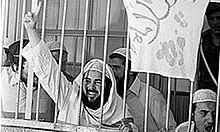Chalid Islambuli

Chalid Ahmed Schowky el-Islambuli ( Arabic خالد أحمد شوقي الإسلامبولي, DMG Ḫālid Aḥmad Šauqī al-Islāmbūlī , ˈxæːled ˈæħmæd ˈʃæwʔi (e) lʔeslæmˈbuːli ; born January 15, 1955 ; died April 15, 1982 ) was a radical Islamist army officer of Turkish origin who murdered the Egyptian President and Nobel Peace Prize laureate Anwar el-Sadat . He was proclaimed the first “modern Shahid ” (martyr of Islam ) by Muslim fundamentalists and extremists around the world .
Early years and careers
Islambuli's father was a legal advisor and his mother was a native of Turkey . Chalid Islambuli had a younger brother named Mohamed Schowky Islambuli who tried to assassinate Sadat's successor, Hosni Mubarak, on June 22, 1995 on the way from Addis Ababa Airport to an African meeting in Addis Ababa .
After Chalid Islambuli had attended the Egyptian Military Academy , he was appointed officer in the rank of sub- lieutenant within the artillery units . Shortly after his appointment, Islambuli became radicalized and, under the influence of Mohamed Abdelsalam Farag, joined the " Egyptian Jihad Movement " terrorist group . Between 1976 and 1980 Islambuli was mostly a staff officer or fire management officer for various artillery batteries , battalions and regiments. In March 1980 he received his first power as commander in chief of an artillery platoon line in the 116th Field Artillery Brigade in Cairo , which he was very pleased and which seemed a welcome opportunity. He was in command of active field howitzers, a reserve field cannon , five to six transport vehicles, seven off-road vehicles, signal equipment, light infantry weapons such as assault rifles, medium machine guns, anti-tank missiles, light mortars and sniper rifles for the organized "attack on Jews ", as well as around 45 soldiers / Recruits each with a second lieutenant and a sergeant as deputy in command and third in command. His job was to carry out fire missions and orders from the battery headquarters. It was planned that Islambuli would rise to captaincy in December 1981 and apply as Staff Officer III in a brigade headquarters.
Assassination of el-Sadat
Islambuli and his procession were not supposed to take part in the annual parade for the "Victory in the Yom Kippur War " on October 6, 1981, but the Egyptian military secret service insisted on his participation; the secret service had been infiltrated by Islamist sympathizers under Colonel Abbud El Zomor . Islambuli replaced a platoon from the 133rd Artillery Battalion, which was not allowed to participate in tests due to alleged failure.
When Islambuli's train with three heavy trucks, each equipped with 130 mm M-46 cannons, reached the gallery of President Anwar el-Sadat, it jumped together with NCO Abdelhameed Abdul Salaam (31) and NCO Ata Tayel Hameeda Raheel (21) and Sergeant Hussein Abbas (21) got out of the car and ran with grenades to the stands of the Egyptian and foreign dignitaries. Islambuli came into the stands and fired. Sadat was hit by 37 bullets and died instantly.
Sentencing and execution
Chalid Islambuli was arrested immediately after the murder. He and his 23 conspirators, including eight military personnel, were tried in an Egyptian military tribunal . The 27-year-old Islambuli said his main reasons for his terrorist attack were the signing of the Camp David agreement with the state of Israel and Sadat's plans for a more progressive Egypt. He was found guilty and shot dead on April 15, 1982 . After the execution, the Shiite ruler and supreme leader of Iran , Ruhollah Khomeini , declared Islambuli a martyr .
Aftermath
Islambuli still serves as a source of inspiration and muse for Islamist movements around the world, including numerous terrorist groups . In 1982 Iran issued postage stamps in his honor; he is pictured screaming behind bars.
On July 31, 2004, al-Qaeda’s “Islambuli Brigades” declared they were responsible for the attempted murder of Shaukat Aziz , who was running for the office of Prime Minister of Pakistan . In the same year a Chechen terrorist group called the Islambuli Brigades issued a statement assuming responsibility for attacks on two planes in Russia on August 24, 2004 .
Individual evidence
- ↑ a b The Islambouli Enigma. The Jamestown Foundation, archived from the original ; Retrieved July 19, 2006 .
- ^ Arthur Goldschmidt: Biographical dictionary of modern Egypt . Lynne Rienner Publishers, 2000, ISBN 1-55587-229-8 , pp. 90 .
- ^ Profiles: Omar Suleiman - Opinion. In: al-Jazeera . Archived from the original on February 13, 2011 ; Retrieved July 1, 2013 .
- ↑ Mubarak 1995 assassination attempt Debka
- ^ Egypt military court releases the brother of Sadat's assassin - Politics - Egypt - Ahram Online. In: english.ahram.org.eg. Retrieved June 5, 2017 .
- ↑ Riedel, Bruce . "The Search for al-Qaeda", 2008
- ↑ al-Zayat, Montasser, "The Road to al-Qaeda", 2002
- ^ A b Martin Kramer: Nation and Assassination in the Middle East . In: Middle East Quarterly . XI, No. 3, Summer 2004, pp. 59-63. Retrieved August 13, 2013.
- ^ Statement from the Chechen "Al-Islambouli Brigades". Global Terror Alert , archived from the original ; Retrieved October 21, 2006 .
| personal data | |
|---|---|
| SURNAME | Islambuli, Chalid |
| ALTERNATIVE NAMES | El-Islambuli, Chalid Ahmed Schowky (full name); خالد أحمد شوقى الإسلامبولى (Arabic) |
| BRIEF DESCRIPTION | Egyptian radical Islamist army officer |
| DATE OF BIRTH | January 15, 1955 |
| DATE OF DEATH | April 15, 1982 |